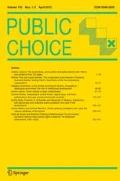Abstract
The unanimous voting rule is often viewed as analogous tovoluntary market exchange. This paper demonstrates that whenthird-party pecuniary effects exist, this analogy breaks downbecause unlike markets, unanimous voting requires compensationfor these effects. Thus, efficient market outcomes typically willbe rejected by the unanimous voting rule. Even when transactionscosts are low enough to make compensation feasible, the political outcome under unanimity will differ from the market outcome. The distributional effects of unanimityprovide the incentive for people to substitute rent-seekingbehavior for productive activity, and reduce the incentive forproductive change, providing additional reasons why a less-than-unanimous voting rule may be optimal when resources are to beallocated politically.
Similar content being viewed by others
References
Bator, F.M. (1958). The anatomy of market failure. Quarterly Journal of Economics 72: 351-379.
Buchanan, J.M. (1990). The domain of constitutional economics. Constitutional Political Economy 1: 1-18.
Buchanan, J.M. and Tullock, G. (1962). The calculus of consent. Ann Arbor: University of Michigan Press.
Coase, R.H. (1960). The problem of social cost. Journal of Law & Economics 3: 1-44.
Gordon. S. (1976). The new contractarians. Journal of Political Economy 84: 573-590.
Holcombe. R.G. (1986). Non-optimal unanimous agreement. Public Choice 48: 229-244.
Holcombe, R.G. (1989). Non-optimal unanimous agreement under majority rule: Reply. Public Choice 62: 89-92.
Holcombe, R.G. (1991). Constitutions as constraints: A case study of three American constitutions. Constitutional Political Economy 2: 303-328.
Lee. D.R. (1991). The political economy of social conflict, or malice in plunderland. In J.L. Doti and D.R. Lee (Eds.), The market economy: A reader, 230-236. Los Angeles: Roxbury Publishing Company.
Lee, D.R. and McKenzie, R.B. (1993). Failure and progress: The bright side of the dismal science. Washington, DC: Cato Institute.
Lee, D.R. (1989). Less than unanimous agreement on the reasons for unanimous agreement: Comment. Public Choice 62: 83-87.
Meade, J.E. (1952). External economies and diseconomies in a competitive situation. Economic Journal 62: 54-67.
Mishan, E.J. (1971). The postwar literature on externalities: An interpretative essay. Journal of Economic Literature 9: 1-28.
Rosen, H.S. (1995). Public finance, 4th ed. Boston: Irwin McGraw-Hill.
Scitovsky, T. (1954). Two concepts of external economies. Journal of Political Economy 62: 143-151.
Wicksell, K. (1967 [1896]). A new principle of just taxation. In R.A. Musgrave and A.T. Peacock (Eds.), Classics in the theory of public finance, 72-118. New York: St.Martin's Press.
Yeager, L.B. (1985). Rights, contract, and utility in policy espousal. Cato Journal 5: 259-294.
Author information
Authors and Affiliations
Rights and permissions
About this article
Cite this article
Sobel, R.S., Holcombe, R.G. The Unanimous Voting Rule is not the Political Equivalent to Market Exchange. Public Choice 106, 233–242 (2001). https://doi.org/10.1023/A:1005298607876
Issue Date:
DOI: https://doi.org/10.1023/A:1005298607876


